It is the worst of times; it is the best of times. But we cannot celebrate the best without overcoming and transcending the worst. This fundamental principle of flourishing is what we want to covey at our forthcoming Meaning Conference.
By all accounts, it is the most consequential and most innovative Meaning Conference we have ever organized, because this virtual international conference involves more speakers and reaches more people around the globe, in spite of the pandemic restriction.
This conference is very special, because we are rising to new challenges in an unprecedented time, and we are celebrating the defiant power of the human spirit by reaching new heights and new depths for new solutions.
Psychology, especially the positive psychology of wellbeing, is being severely tested by the COVID-19 mental health fallout. Yes, amid all the talks of gloom and doom, we can still see an awe-inspiring rainbow on the horizon.
Indeed, we don’t know how strong we are until we have to be strong in order to survive. Adversity either breaks us and makes us bitter or makes us strong and better. This conference will be a festival of love, hope, and faith, which transforms vulnerability to resilience.
In addition to transformational keynotes, music (award winning singer Francine Honey, flamenco flautist and guitar duo Lara Wong & Melón Jiménez, and film/TV producer and pianist Matt Weisberg, among others), and Qi Gong (led by Qi Gong Master Mitch Hall), the Global Mental Health Summits consists of four symposia – The future of wellbeing research, The resilient mindset, The new science of flourishing thru suffering and The future of Mental Health
1) Towards a General Theory of Global Wellbeing – Remembering Ed Diener
Dr. Diener was a genius who laid the foundation for happiness and wellbeing research. I personally know the other side of Diener – he cared for contextual factors, such as cultural differences and happiness in very difficult situations and supported endeavours in these two directions years ago. He proudly mentioned that his son was also doing research in this new frontier. In this symposium, we will present new developments in theory and research showing that there are indeed different kinds of happiness and happy people in different cultures and trying circumstance, but none of us can get away from the large all-encompassing circle of Subjective Wellbeing (SWB). Participants will include Robert Emmons, Todd Kashdan, Robert Biswas-Diener, and Tim Lomas.
The following figures represents some of the ideas I have been developing. Hope that you can all contribute to the refinement of this global theory. See Figure 1 depicting different types of happiness and Figure 2 for different types of wellbeing. Also see my tentative global theory of wellbeing which represents the ideal of Taoism of the self being in harmony with Heaven, Earth, and People (Figure 3).
Aristotle was a very wise man. He acknowledged that different people from different cultures seek different types of happiness. Martin Seligman recognizes three types of happiness – Pleasure (Hedonic), Passion (flow) and Purpose (eudaimonia).
As an Asian, growing up in a collectivist society and schooled in teachings from Confucianism, Taoism, and Buddhism, I-Ching offers the Way to live a good life in an uncertain and ever-changing world. Happiness is never just about the individual, but about harmony in society, as reflected by the Taoist concept of the union between Heaven and people ( 天人合一) or living in harmony with Heaven, Earth, and People (天地人和). In traditional Chinese culture, getting along or maintaining harmony is more important than getting ahead and causing conflict.
Therefore, the less travelled path to happiness is to attain peace and harmony with self, others, as well as Heaven and Earth. My vision for global wellbeing reflects an integration between East and West. You will not hear this new paradigm in any positive psychology conferences in North America. That is why I have created the Biennial Meaning Conferences as a big tent or open space for different approaches to human flourishing and positive education. This brief article provides a preview of all the exciting new ideas you can discover from the forthcoming Meaning Conference 2021.
Figure 1
Three Main Types of Happiness
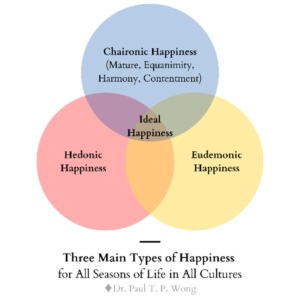
Figure 2
Different Types of Wellbeing (WB)
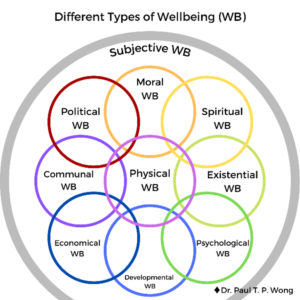
Figure 3
Towards a General Theory of Global Wellbeing
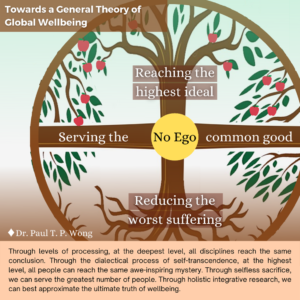
2) From Vulnerability to Resilience – Remembering Salvatore I. Maddi
Another under-rated genius has left us. Dr. Maddi was the first to show that resilience was more than just bouncing back; it was rather a matter of developing a resilient mindset of existential courage, optimism, and hardiness. A big part of this cultivation includes acceptance, compassion, mindfulness, and meaning transformation, as shown by the resilience mindset in Figure 4. The pandemic provides an ideal natural laboratory to do research on the resilient mind, from existential gratitude, tragic optimism, the courage to undergo suffering, and the power of faith. Participants will include Gokmen Arslan, Blaine Fowers, and Darcia Narvaez.
Figure 4
The Resilient Mindset (BRAMMT)
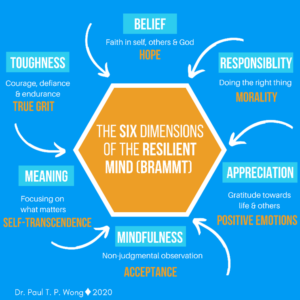
3) The New Science of Flourishing – Remembering Frankl
So much research has been done on flourishing. This new science does break new ground, shifting the focus from the horizontal to the vertical dimension. It is more than just a supplement to classic positive psychology. It represents a new paradigm involving new assumptions and research methodology (Wong, 2021a). See Figure 5 contrasting Seligman and Wong.
Figure 5
Seligman’s (2011) Model of Flourishing Compared with Wong’s (2021) Self-transcendence Model of Flourishing Through Suffering
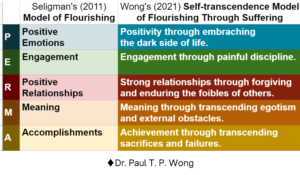
This new science of existential positive psychology was pioneered by Viktor Frankl and expanded by Paul Wong (2021b). Both began their search when they hit rock bottom. Their self-transcendence model can be described as going higher to fulfill one’s aspirations and going deeper to sink one’s roots in suffering, resulting in spreading one’s branches full of delicious fruit for all people. Maslow’s approach begins with self-acceptance. It was recently expanded on by Scott Barry Kaufman (2020) The common thread is how to lose oneself to serve something greater and awe-inspiriting (See Figure 6). The recent Frontiers special issue on existential positive psychology reveals the rapid development of this new science. Participants will include Scott Barry Kaufman, Paul T. P. Wong, Richard Cowden, and Andrew Kemp.
Figure 6
The New Science of Flourishing Through Suffering
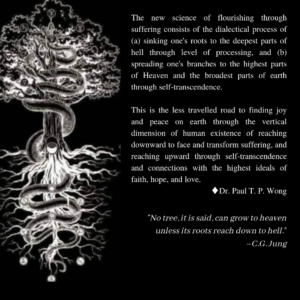
4) The Future of Mental Health
The inadequacy of mental health based on a medical model has been laid bare by the pandemic. The future of mental health needs to be holistic and indigenous. Once freed from the expansive and narrow confine of medicine to include psychology, philosophy, religion, etc., we will be able to develop a much broader model of positive mental health, which has universal appeal and applicable to all individuals (see Figure 7). In other words, it will be transdiagnostic, pluralistic, multicultural, and integrative (Wong, 2020). Ideally, good mental health should be based on the existential needs of all humanity and employs interventions that can help all people because of our common humanity and universally endowed innate capabilities (see figure 8). Participants will include Kirk Schneider, Robert A. Neimeyer, Farooq Naeem, Christina Becker, Louis Hoffman, Brendan W. Case, and Paul T. P. Wong.
Figure 7
The Future of Mental Health
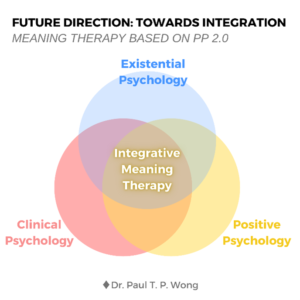
Figure 8
The Diamond Model of Mental Health
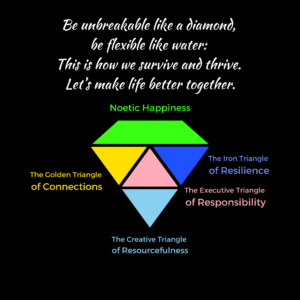
Conclusion
As you can see, there is a lot of creative energy at our conference. Please join us to celebrate an important milestone in the evolution of wellbeing research and mental health delivery. More importantly, witness how the human spirit soars to new heights from the depth of suffering and despair. I also hope that readers of this article well submit personal testimonies, poetry, and artwork that demonstrate the explosive power of the human spirit and creativity.
Looking forward to interacting with all of you at the conference. Don’t forget to register now.
References
- Kaufman, S. B. (2020). Transcend: The New Science of Self-Actualization. Tarcher Perigee.
- Wong, P. T. P. (2020). Existential Positive Psychology and Integrative Meaning Therapy. International Review of Psychiatry. Doi: 10.1080/09540261.2020.1814703
- Wong, P. T. P. (2021a). Existential Positive Psychology (PP 2.0) and global wellbeing: Why it is Necessary During the Age of COVID-19. International Journal of Existential Positive Psychology, 10(1), 1-16.
- Wong, P. T. P. (2021b). The Frankl cure for the 21st century: Why self-transcendence is the key to mental health and flourishing. PsyArXiv. Doi: 10.31234/osf.io/tbx3f
Cite
Wong, P. T. P. (2021). A festival to celebrate the human spirit [President’s Column]. Positive Living Newsletter. http://www.drpaulwong.com/a-festival-to-celebrate-the-human-spirit/

 Meaning Conference 2025 will be the INPM’s first in-person conference with a virtual option after the pandemic.
Meaning Conference 2025 will be the INPM’s first in-person conference with a virtual option after the pandemic.